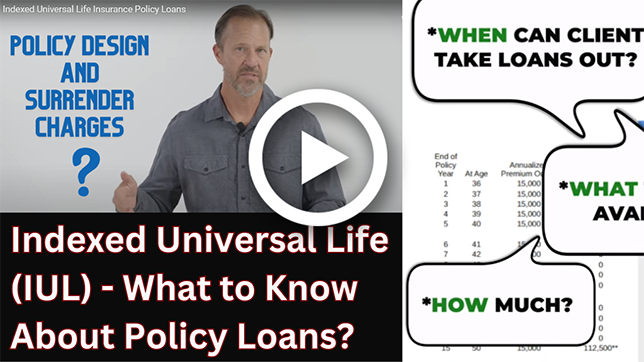All Categories
Featured
Table of Contents
1), typically in an attempt to defeat their classification standards. This is a straw man debate, and one IUL folks love to make. Do they contrast the IUL to something like the Vanguard Total Stock Exchange Fund Admiral Show to no load, an expense proportion (ER) of 5 basis factors, a turnover proportion of 4.3%, and an outstanding tax-efficient document of distributions? No, they contrast it to some awful actively managed fund with an 8% tons, a 2% ER, an 80% turnover proportion, and an awful document of temporary capital gain distributions.
Mutual funds commonly make annual taxed distributions to fund owners, even when the value of their fund has decreased in worth. Mutual funds not only require income reporting (and the resulting annual tax) when the shared fund is rising in worth, however can also impose income taxes in a year when the fund has dropped in value.
You can tax-manage the fund, gathering losses and gains in order to decrease taxed distributions to the financiers, however that isn't in some way going to transform the reported return of the fund. The ownership of shared funds might require the mutual fund owner to pay estimated tax obligations (iul insurance calculator).

IULs are simple to place so that, at the proprietor's fatality, the beneficiary is exempt to either income or inheritance tax. The same tax decrease techniques do not work virtually also with mutual funds. There are numerous, commonly costly, tax catches associated with the timed trading of common fund shares, traps that do not relate to indexed life Insurance.
Chances aren't extremely high that you're mosting likely to go through the AMT as a result of your common fund circulations if you aren't without them. The rest of this one is half-truths at best. As an example, while it holds true that there is no income tax obligation because of your beneficiaries when they acquire the earnings of your IUL policy, it is also real that there is no earnings tax due to your successors when they inherit a mutual fund in a taxable account from you.
Universal Insurance Usa
There are better ways to avoid estate tax obligation problems than buying investments with low returns. Shared funds may trigger earnings tax of Social Security advantages.

The development within the IUL is tax-deferred and might be taken as free of tax earnings through car loans. The policy proprietor (vs. the common fund supervisor) is in control of his or her reportable earnings, thus enabling them to minimize and even get rid of the taxation of their Social Security advantages. This set is fantastic.
Here's an additional very little problem. It's real if you acquire a common fund for state $10 per share prior to the distribution day, and it distributes a $0.50 circulation, you are then mosting likely to owe taxes (probably 7-10 cents per share) regardless of the fact that you have not yet had any kind of gains.
In the end, it's actually about the after-tax return, not just how much you pay in taxes. You are mosting likely to pay even more in tax obligations by making use of a taxable account than if you acquire life insurance policy. You're likewise possibly going to have even more money after paying those tax obligations. The record-keeping requirements for possessing mutual funds are considerably extra complicated.
With an IUL, one's documents are kept by the insurer, duplicates of yearly statements are sent by mail to the proprietor, and distributions (if any kind of) are completed and reported at year end. This one is also sort of silly. Naturally you should keep your tax records in situation of an audit.
Variable Universal Life Insurance Quotes
All you need to do is shove the paper into your tax folder when it turns up in the mail. Hardly a reason to acquire life insurance policy. It resembles this individual has never ever invested in a taxed account or something. Common funds are typically part of a decedent's probated estate.
In addition, they go through the hold-ups and costs of probate. The earnings of the IUL policy, on the other hand, is constantly a non-probate circulation that passes beyond probate directly to one's named beneficiaries, and is for that reason exempt to one's posthumous lenders, unwanted public disclosure, or similar hold-ups and prices.
Medicaid incompetency and life time income. An IUL can provide their owners with a stream of income for their entire life time, regardless of exactly how long they live.

This is useful when organizing one's events, and transforming assets to revenue prior to an assisted living facility arrest. Mutual funds can not be transformed in a similar way, and are usually taken into consideration countable Medicaid assets. This is an additional foolish one supporting that bad people (you recognize, the ones who require Medicaid, a federal government program for the inadequate, to pay for their retirement home) need to utilize IUL rather of common funds.
Universal Life Insurance Interest Rates
And life insurance policy looks terrible when compared relatively against a pension. Second, people that have cash to acquire IUL above and beyond their pension are mosting likely to need to be awful at handling cash in order to ever get approved for Medicaid to pay for their nursing home prices.
Chronic and terminal ailment biker. All policies will allow an owner's simple access to money from their plan, frequently waiving any kind of surrender penalties when such people experience a major health problem, require at-home treatment, or end up being constrained to an assisted living facility. Mutual funds do not offer a comparable waiver when contingent deferred sales costs still relate to a common fund account whose proprietor requires to sell some shares to fund the prices of such a keep.
Mutual Of Omaha Universal Life Insurance
Yet you obtain to pay even more for that benefit (motorcyclist) with an insurance plan. What an excellent deal! Indexed universal life insurance offers survivor benefit to the beneficiaries of the IUL owners, and neither the proprietor neither the beneficiary can ever shed cash because of a down market. Common funds give no such guarantees or fatality advantages of any kind of kind.
Now, ask yourself, do you in fact require or want a death advantage? I certainly don't need one after I get to financial freedom. Do I want one? I intend if it were low-cost enough. Certainly, it isn't affordable. Usually, a purchaser of life insurance policy spends for the true price of the life insurance policy advantage, plus the costs of the plan, plus the earnings of the insurance provider.
Universal Life Insurance For Retirement Income
I'm not totally certain why Mr. Morais included the entire "you can't shed cash" once again here as it was covered fairly well in # 1. He just wished to duplicate the ideal selling factor for these points I expect. Once again, you don't shed nominal dollars, but you can shed actual dollars, in addition to face major possibility cost because of reduced returns.

An indexed universal life insurance policy policy owner may exchange their policy for a completely various plan without activating income tax obligations. A shared fund proprietor can stagnate funds from one shared fund business to one more without selling his shares at the former (thus triggering a taxable occasion), and repurchasing brand-new shares at the last, often subject to sales costs at both.
While it holds true that you can exchange one insurance coverage for an additional, the reason that individuals do this is that the very first one is such a horrible policy that also after acquiring a brand-new one and experiencing the very early, adverse return years, you'll still come out ahead. If they were marketed the ideal policy the initial time, they should not have any need to ever before exchange it and undergo the early, unfavorable return years once again.
Latest Posts
Variable Universal Life Vs Indexed Universal Life
Universal Life Insurance Ratings
Guaranteed Universal Life Insurance Rates